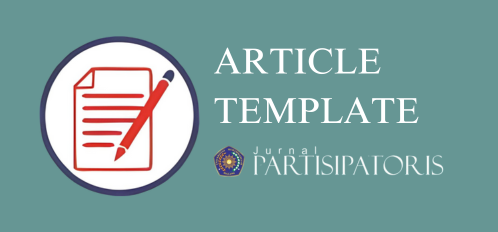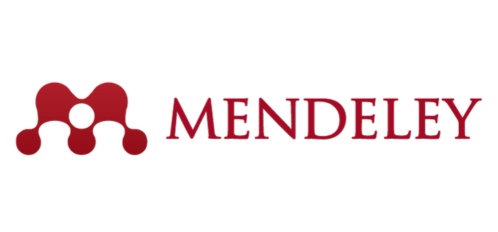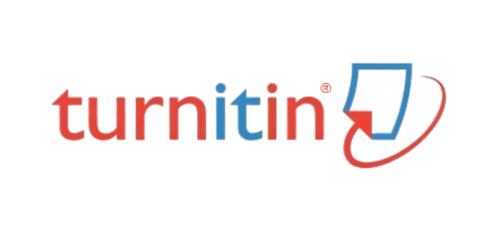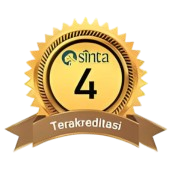Efektivitas Peran Tenaga Kesejahteraan Sosial Kecamatan (TKSK) dalam Implementasi Program Keluarga Harapan di Kapanewon Sewon Kabupaten Bantul
DOI:
https://doi.org/10.22219/jp.v6i1.35122Abstract
The role of social welfare workers (TKSK) in sub-districts aims to make the distribution of aid from the government to poor families and recipients of the Family Hope Program in Sewon sub-district a success. This is the key to community welfare in Sewon Subdistrict This study aims to determine the role of the sub-district Social Welfare Workers (TKSK) in the implementation of the family hope program to help people with Social Welfare Problems, and to find out what are the supporting and inhibiting factors for the implementation of the role of the District Social Welfare Workers (TKSK) in facilitating People with Social Welfare Problems (PMKS). Data collection techniques in this study used observation, interviews, and documentation. The results showed that the role of the District Social Welfare Workers (TKSK) has not played a good role in facilitating communities with Social Welfare Problems in Sewon sub-district and also assistance. This happened because of the limited ability of the Subdistrict Social Welfare Workers (TKSK) in dealing with communities with Social Welfare Problems in collaboration between the sub-district TKSK Social Welfare Workers and the government, PKH Coordinators, TKSK in the area, and fellow District Social Welfare Workers (TKSK). The form of assistance provided by the Government or Social Services is the Family Hope Program (PKH).
Downloads
References
Ade Eka Kurniawan. (2016). Peranan Badan Usaha Milik Desa (BUMDes) Dalam Peningkatan Pendapatan Asli Desa (Desa Lanjut Kecamatan Singkep Pesisir Kabupaten Lingga Tahun 2015). Fakultas Ilmu Sosial Dan Ilmu Politik Universitas Maritim Raja Ali Haji, 33.
Agustin, A. (2014). Efektivitas Dana Pembangunan Fisik Desa Pucangro Kecamatan Gudo Kabupaten Jombang. Jurnal Administrasi Publik Mahasiswa Universitas Brawijaya, 2(4), 735–739.
Aneta, A. (2012). Implementasi Kebijakan Program Penanggulangan Kemiskinan Perkotaan (P2KP) Di Kota Gorontalo. Jurnal Ilmiah Ilmu Administrasi Publik, 1(1), 54. https://doi.org/10.26858/jiap.v1i1.132
Bungkaes, H. R., Posumah, J. H., & Kiyai Burhanuddin. (2013). Hubungan Efektivitas Pengelolaan Program RaskinDengan Peningkatan Kesejahteraan MasyarakatDi Desa Mamahan Kecamatan GemehKabupaten Kepualauan Talaud. Acta Diurna, April, 1–23.
Haerul, Akib, H., & . H. (2016). Implementasi Kebijakan Program Makassar Tidak Rantasa (Mtr) Di Kota Makassar. Jurnal Ilmiah Ilmu Administrasi Publik, 6(2), 21. https://doi.org/10.26858/jiap.v6i2.2477
Harahap, S. (2018). Pengaruh Gaya Kepemimpinan Dan Stres Kerja Terhadap Kinerja Pendamping Pada Program Keluarga Harapan Tapanuli Selatan. 4(1), 1–72.
Haryanto, Sumardjo, Y., Amanah, S., & Tjitropranoto, P. (2017). Efektivitas Peran Penyuluh Swadaya Dalam Pemberdayaan Petani. Jurnal Pengkajian Dan Pengembangan Teknologi Pertanian, 20(2), 141–154.
Kartiawati. (2017). Analisis efektivitas program keluarga harapan (pkh) dalam pengentasan kemiskinan ditinjau dari perspektif ekonomi islam.
Kiwang, A. S., Pandie, D. B. W., & Gana, F. (2015). Analisis Kebijakan dan Efektivitas Organisasi. JKAP (Jurnal Kebijakan Dan Administrasi Publik), 19(1), 71. https://doi.org/10.22146/jkap.7535
Nilamsari, N. (2014). Memahami Studi Dokumen Dalam Penelitian Kualitatif. Wacana, 13(2), 177–181.
Norsanti, N., & Safitri, W. (2019). Efektivitas Program Keluarga Harapan (Pkh) Di Desa Hauwai Kecamatan Halong Kabupaten Balangan. AS-SIYASAH: Jurnal Ilmu Sosial Dan Ilmu Politik, 4(1), 1. https://doi.org/10.31602/as.v4i1.2335
Nurul Najidah. (2013). Efektivitas Program Keluarga Harapan (Pkh) Di Kelurahan Rowosari Kecamatan Tembalang Kota Semarang. Journal of Chemical Information and Modeling, 53(9), 1689–1699.
Purwanto, S. A., & Makmur, M. (2013). Implementasi Kebijakan Program Keluarga Harapan (PKH) dalam Memutus Rantai Kemiskinan (Kajian di Kecamatan Mojosari Kabupaten Mojokerto) The Policy Implementation of Prosperous Family Program (PKH) in Giving Social Protection to The Poor Community). Wacana, 16(2), 79–96. ejournal.ip.fisip-unmul.ac.id
Rijali, A. (2019). Analisis Data Kualitatif [Qualitative Data Analysis]. Alhadharah: Jurnal Ilmu Dakwah, 17(33), 81.
Sabarisman, M. (2018). Penanggulangan kemiskinan selalu digiatkan oleh berbagai lapisan masyarakat dan pemerintahan dari tahun ke tahun. 145– 161.
Siti Nur Aisah. (2020). Pengaruh Gaya Kepemimpinan Terhadap Kinerja Karyawan. Bulletin of Management and Business, 1(2), 42–50. https://doi.org/10.31328/bmb.v1i2.100
Sudrajat, M., Sumpena, D., & Azis, R. (2017). Peranan Tenaga Kesejahteraan Sosial Dalam Meningkatkan Kesejahteraan Keluarga Miskin. Tamkin: Jurnal Pengembangan Masyarakat Islam, 2(2), 1–21.
Usman, C. (2014). Efektivitas Program Keluarga Harapan (Pkh) Dalam Rangka Penanggulangan Kemiskinan (Suatu Studi Di Kecamatan Kota Utara Kota Gorontalo). Jurnal Administrasi Publik UNSRAT, 2(001), 1200.
Yulita, R. (2016). Efektivitas Pelaksanaan Penggunaan Alokasi Dana Desa (ADD) di desa Setako Raya Kecamatan Peranap Kabupaten Indragiri Hulu. Jom Fisip, 3(2), 1689–1699.
Yuni Astuti. (2014). Persepsi Masyarakat Prasejahtera Terhadap Pelaksanaan Kebijakan Distributif Melalui Program Keluarga Harapan (PKH).
Yunus, E. Y. (2021). Mendampingi Masyarakat Penyandang Masalah Kesejahteraan. 3(1), 62–70.
Downloads
Published
How to Cite
Issue
Section
License
Copyright (c) 2024 Ayu Khairur Rizqiyah, Hanantyo Sri Nugroho

This work is licensed under a Creative Commons Attribution-ShareAlike 4.0 International License.
Authors who publish with Jurnal Partisipatoris agree to the following terms:
- For all articles published in the Jurnal partisipatoris, copyright is retained by the authors. Authors give permission to the publisher to announce the work with conditions. When the manuscript is accepted for publication, the authors agree to the automatic transfer of non-exclusive publishing rights to the publisher.
- Authors retain copyright and grant the journal right of first publication with the work simultaneously licensed under a Creative Commons Attribution-ShareAlike 4.0 International License that allows others to share the work with an acknowledgment of the work's authorship and initial publication in this journal.
- Authors are able to enter into separate, additional contractual arrangements for the non-exclusive distribution of the journal's published version of the work (e.g., post it to an institutional repository or publish it in a book), with an acknowledgment of its initial publication in this journal.
- Authors are permitted and encouraged to post their work online (e.g., in institutional repositories or on their website) prior to and during the submission process, as it can lead to productive exchanges, as well as earlier and greater citation of published work (See The Effect of Open Access).











